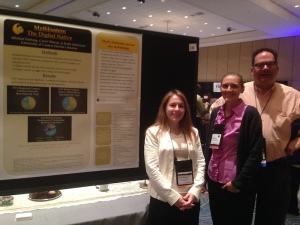I’m hoping that anyone who reads this had the chance to go to summer camp as a kid, and to actually enjoy the experience. There’s something magical about time away from home with people you see infrequently, doing different things, learning together, and getting very little sleep. When I was leaving ALA’s Annual Conference in Las Vegas I felt like I was leaving summer camp.
This feeling may have been heightened by the fact that I was staying with seven other librarians in two suites, but I think the communal aspect comes through even when you are staying solo. I can (and will) talk about the sessions, meetings, and learning but what I found most valuable this year was the time to be around other librarians having conversations ranging from personal to professional and back again. The eight of us that stayed together came from Florida, Ohio, Texas, California, Utah, Mississippi, and North Carolina. Some of us had met in person, or online, or not at all.
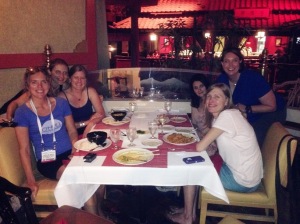
Most of the suite at dinner
We spent a lot of time together in the evenings and in spare moments. I took something from all of them, and from the myriad other librarians with whom I interacted. The most important outcome of this conference for me was a rekindling of my passion for what I do. It’s never been lost, and I am more thankful each day for the work I do, but I’ve had a rough year personally. I separated from my partner of 11 ½ years, and there were times when it felt impossible to focus on work. I am healing, growing, and changing from the experience and ALA felt like a confirmation that I’m ready and able to throw myself fully into librarianship again.
That being said, the rest of my conference was good although not as rich for learning from sessions as other conferences I’ve attended. This was primarily due to the things I had to do for committees and work projects that took away from the time I could spend in sessions, coupled with a frustrating experience traveling to/from events. My first big/important event was Saturday morning, when I moderated the ACRL DLS/ULS panel “Leading From the Side: On, Off, and Within Your Campus”. It’s interesting to be on the other side of the podium at ALA!
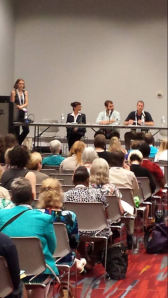
Doing my moderation thing!
The room looked massive, and we had around 180 attendees. I got there early to make sure we were set up and that our speakers were comfortable. The session went well from what I could tell. I had to modify some of the language written on our outline to make the session flow better, but it was a good way to stay fully engaged while the panelists were speaking. As a side bonus, the information they imparted was useful! I got to catch up with some friendly faces and meet some new people after the session, and I felt a big weight lift off after we successfully implemented the panel session.
On Saturday I also attended the inaugural Sustainability Round Table (SustainRT) board meeting. I went to a meeting for SustainRT at ALA in Chicago and agreed to be their webmaster, a role that I am still committed to. I’m also the unofficial social media person. The meeting was fantastic, there was a lot of energy in the room and I think we made some great decisions about how to move forward. If you have any interest in sustainability in libraries (environmental, collections, architecture, outreach, instruction, really anything!) it’s a great group to join.
After that I attended a session on training from the Learning Round Table that was interesting but not applicable to what I’m doing, however it did pique my interest in that RT. After a “quick” trip back to the hotel, several of my suitemates and I attended the joint ULS/DLS social. It was good to see more familiar faces that I met in Chicago and meet some new librarians. After that most of our suite went to see the V variety show and spent some time taking in the ridiculous Strip.
Sunday morning I met a colleague at the Springshare booth where we spent about 90 minutes talking through our LibGuides V2 migration that happened yesterday! He and I are leading the effort to migrate and hopefully revamp our guides. I spent a good bit of time in and out of the exhibits area this year and I thought it was very well done. I also held out for the best swag!
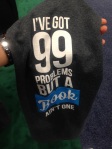
After my meeting I caught the Sunday Ignite sessions and got to see a friend from NC do a presentation. I enjoyed every single one and took some short but good notes on marketing and design. I attended the SustainRT lightning rounds in the early afternoon. It was great to see the cool sustainability work going on in libraries around the country. I hope SustainRT can continue to hold the lightning round sessions at future conferences. It’s a great format for sharing.
After the lightning rounds I made my way to the Starbucks to meet my Hyperlinked Library MOOC instructor Michael Stephens in person. I ran into my panel co-chair John Jackson in line and the three of us had a great conversation.
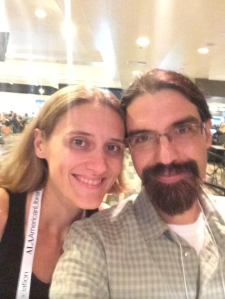
That evening I attended the LearnRT social at the LVH pool with some of my suitemates and a UCF colleague/friend. We met librarians from around the US and Canada, and enjoyed our time by the pool. After that we had dinner in the LVH and then spent a bit of time on the Strip before returning to the hotel. We all had early Monday meetings!
Monday morning we spent the hour getting to the Convention Center and then several of us attended the meeting for the ACRL Innovations Committee that is working on several events/opportunities/things for the 2015 conference in Portland. It was a busy 90 minutes but we got a lot accomplished. I like being able to meet with my committee members in person, it makes it easier to communicate virtually after you have a chance to get to know people. In the afternoon six of us drove out to the desert to hike Mary Jane Falls in the Mt. Charleston area.
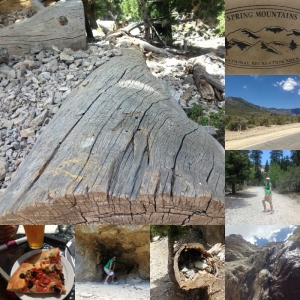
Even the hike was educational! At some point during the 3 mile round trip I paired off with each person for a while and had discussions about programs, instruction, imposter syndrome, career development, publishing and research (among more personal topics!). That night I attended a burlesque show with some colleagues. Tuesday morning was time to say goodbye. My flight was at noon and I was blessed to have one of my suitemates on the same first leg of the flight! We didn’t plan it and figured it out once we were in Vegas. I love when life works out that way.
If you’re still with me or TL;DR: great trip!
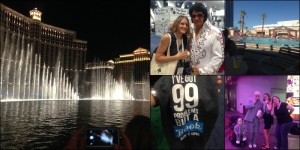
Scenes from the trip






